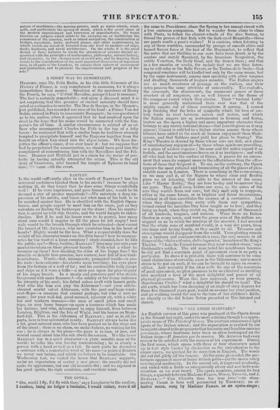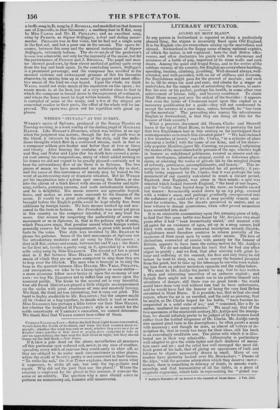WEIGUS "GLI AMOR' MARINARI."
AN English version of this piece was produced at the Opera-house in the Strand last night, under the more catching though less appro priate, name of The Pirate of Genoa. The overture announces a light opera of the Italian school ; and the expectation is realized by our beingintroduced in its progress to that favourite and laughter-moving personage, whose functions have been so often burlesqued on the Italian stage—II fanatico per la musica. Mr. ARNOLD had every reason to be satisfied with the success of his experiment. During the first scene, which opens with three or four characters mixed up in that style known by distinction as the introduction to the comic opera, we quaked for its reception in English. The words did not roll glibly off the tongue. As the piece proceeded, the performers appeared more at home in their parts—yet the music rarely rose beyond mediocrity. In the second act, it improved gradually, and ended with a finale as unexpectedly clever and new in its construction as we ever heard. The opera numbers, among its best things, a quartett between Madame FERON, Woof), THORNE, and J. RUSSELL—" Can Claretta thus her true love,"—(a stammering Count is here well personated by THORNE); an effective scena, sung by Madame FERON, as an opera-singer ; a buffo song in D, sung by J. RUSSELL, and modelled on that famous one of Leporello, in Don Giovanni ; a soothing duet in E flat, sung by Miss Cawse and Mr. H. PHILLIPS; and an excellent song, sung by PE NSON, as Signor Solfeggio, a deaf and doting musicmaster. PHILLIPS was in fine voice, but he had not a single song in the first act, and but a poor one in the second. The opera becomes, between this song and the musical instructions of Signor Solfeggio, extremely tedious. The do-re-mi-fa of the professor's lesson was admirable, not only for the ingenuity of the music, but for the performance of Pealsoar and J. RUSSELL. The pupil and master showed good ears, by their clever method of getting quite away from the key and back again. In the concluding scenes, Solfeggio is a prominent personage, and the composer has revelled in the musical violence and extravagant grimace of this his favourite character, by mixing him up in some of the gayest and most effective music of the kind we ever heard. Upon the whole, we think WEIGL would not stake much of his reputation on this opera ; for comic music. is, at the best, but of a very inferior class to that in which the composer is bound down to the expression of sentiment, and where the fancy must be kept within bounds. When the piece is curtailed of some of the songs, and a few of the singers are somewhat readier in their parts, the effect of the whole will be improved. The opera was given out for repetition with great applause.



















 Previous page
Previous page